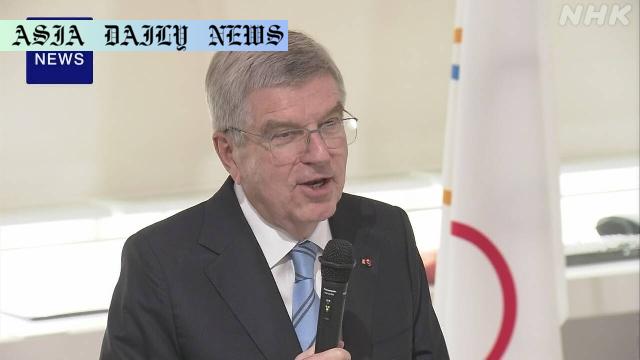Tokyo Olympics: Thomas Bach praises Japanese people for hosting the 2021 Games amidst pandemic challenges.
Bach reflects on the 2021 Tokyo Olympics held during the pandemic.
He received the Grand Cordon of the Order of the Rising Sun.
Bach emphasizes support from Japanese people in making the event successful.
Kirsty Coventry is announced as the first female IOC president succeeding Bach.

Thomas Bach’s Visit to Japan and the Historic Honor
Thomas Bach, the outgoing president of the International Olympic Committee (IOC), recently visited Japan to reflect on the extraordinary accomplishment of hosting the Tokyo Olympics in 2021. His visit was deeply symbolic, as he was bestowed with the prestigious Grand Cordon of the Order of the Rising Sun at the Imperial Palace. This high honor recognized his enduring efforts in promoting sports globally and for enabling the successful execution of the Tokyo Summer Games despite unprecedented challenges.
The Tokyo Olympics were held in the midst of one of the world’s most difficult times due to the COVID-19 pandemic. Despite the lack of spectators and the logistical obstacles posed by the health crisis, the event stood as a testament to resilience, adaptability, and international cooperation. During a ceremony commemorating the honor, Bach expressed deep gratitude to the people of Japan, for their invaluable role in enabling the Games and ensuring their success.
The Tokyo Olympics and Global Challenges
Reflecting on the Tokyo Games, Bach elaborated on the unique conditions under which the event took place. He noted that when preparations for the Games began, no one could have anticipated the challenges that lay ahead. The pandemic forced the postponement of the 2020 event to an unusual 2021 timeline, transforming the dynamics of global sports events altogether.
Without live spectators, the Games had to embrace innovative solutions, including enhanced digital streaming and virtual experiences, to connect audiences globally. Bach credited the Japanese people for their unwavering support in this endeavor, highlighting their resilience and adaptability as instrumental in overcoming these challenges. He believed that the Tokyo Olympics not only showcased athletic excellence but also reinforced the importance of unity and perseverance in the face of adversity.
A Changing Leadership in the IOC
Bach’s presidency marks the end of an era for the IOC, spanning an impressive 12 years of leadership. His tenure was defined by a strong commitment to leveraging sports as a medium for peace and global collaboration. He stated that this vision stemmed from his personal belief in the transformative power of sports.
As Bach prepares to pass the baton to Kirsty Coventry of Zimbabwe, who will be the first female president of the IOC, he expressed confidence in her ability to guide the organization in the right direction. Coventry, an accomplished former athlete, shares Bach’s passion for using sports to foster understanding and harmony among nations.
Looking Ahead: Lessons and Legacy
The legacy of the Tokyo Olympics under Thomas Bach’s leadership will undoubtedly be remembered for its ability to foster unity and resilience during an unparalleled global crisis. For Japan, the Games were a moment of pride, showcasing their capacity to rise above challenges and deliver a world-class platform for athletes and audiences alike.
Bach’s optimism about Coventry’s leadership reflects his confidence in the continuity of the IOC’s mission. As the organization navigates an evolving global landscape, the lessons from the Tokyo Olympics will serve as a guiding blueprint for future sporting events. The emphasis on innovation, adaptability, and inclusivity are likely to remain at the forefront of the IOC’s strategies in its quest for fostering harmony through sports.
Commentary
Reflecting on Thomas Bach’s Leadership
Thomas Bach’s tenure as the president of the International Olympic Committee represents a significant chapter in the history of global sports leadership. Over the last 12 years, Bach has successfully championed the idea that sports can be a unifying force in a fragmented world. His instrumental role in ensuring the success of the Tokyo Olympics during the COVID-19 pandemic is a striking example of his commitment to this vision.
Bach’s approach to challenges, particularly the unprecedented circumstances surrounding the 2021 Summer Games, demonstrated a resilience that serves as an inspiration for future leaders in the sports world. His ability to bring stakeholders together, even under the strain of global uncertainty, will likely be one of his most enduring legacies.
The Significance of the Tokyo Olympics
The fact that the Tokyo Olympics were able to occur at all is a testament to Japan’s sense of duty and determination, as well as Bach’s leadership within the IOC. The Games helped rekindle a sense of hope and normalcy in a time of great uncertainty. By adapting to pandemic-related restrictions, the IOC demonstrated its capacity for planning under pressure, introducing innovative solutions to engage global audiences virtually.
Such foresight underscores the important role that the IOC plays beyond just organizing sporting events. The symbolic importance of holding the Olympics – even amidst difficulties – resonated deeply worldwide, reminding us of the power of facing challenges with courage and unity.
Looking Forward: The Kirsty Coventry Era
Kirsty Coventry’s upcoming leadership marks a new chapter for the IOC. Being the organization’s first-ever female chief signals progress and inclusivity in sports governance. Her background as an Olympian and her dedication to the values that Bach upheld are promising indicators of her ability to lead with both insight and empathy.
As the IOC prepares to navigate new challenges in the coming decades, the groundwork laid by Bach will undoubtedly influence Coventry’s approach. The emphasis on community building, fair competition, and global cooperation will continue to guide the organization towards a bright future.


